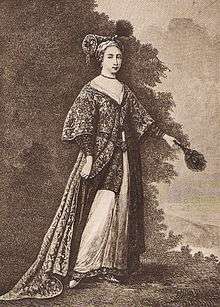Marie Champmeslé
Marie Champmeslé (18 February 1642 – 15 May 1698) was a 17th-century French actress.

Biography
She was born in Rouen of a wealthy family; her father's name was Desmares. She made her first appearance on the stage at Rouen with Charles Chevillet Champmeslé (1645-1707), who called himself sieur de Champmeslé, and they were married in 1666. By 1669 they were playing in Paris at the Theatre du Marais, her first appearance there being as Venus in Boyer's Fête de Vénus. The next year, as Hermione in Jean Racine's Andromaque, she had a great success at the Hotel de Bourgogne.
Her intimacy with Racine dates from then. Some of his finest tragedies were written for her, but her repertoire was not confined to them, and many an indifferent play - like Thomas Corneille's Ariane and Comte d'Essex - owed its success to her natural manner of acting, and her pathetic rendering of the hapless heroine. Phèdre was the climax of her triumphs.
She and her husband deserted the Hotel de Bourgogne for the Théâtre Guénégaud.[1] When the latter company merged into the new Comédie-Française, Phaedre was selected for the opening on 26 August 1680 (see Troupe of the Comédie-Française in 1680). Here, with Madame Gurin as the leading comedy actress, she played the great tragic love parts for more than thirty years.
During her career, “La Champmeslé” created a large number of famous roles. Besides those already mentioned, she did Bérénice, Ariane, Atalide in Bajazet, Monime in Mithridate, Iphigénie in Iphigénie en Aulide, and the same character in Oreste et Pylade. She left the stage in a vain attempt to restore her health at Anteuil, where she died.[1]
La Fontaine dedicated to her his novel Belphegor, and Boileau immortalized her in verse.
Family
Her husband distinguished himself both as actor and playwright, and his Farisien (1682) gave Mme Gurin one of her greatest successes.
Her brother, the actor Nicolas Desmares (c. 1650-1714), began as a member of a subsidized company at Copenhagen, but by her influence he came to Paris and was received in 1685 sans debut, the first time such an honor had been accorded at the Comedie Francaise, where he became famous for peasant parts. His daughter, to whom Christian V. and his queen stood sponsors, Christine Antoinette Charlotte Desmares (1682-1753), was a fine actress in both tragedy and soubrette parts. She made her debut at the Comédie-Française in 1699, in La Grange Chancels Oreste et Pylade, and was at once received as sociétaire. She retired in 1721.
Notes
- Gilman, D. C.; Peck, H. T.; Colby, F. M., eds. (1905). . New International Encyclopedia (1st ed.). New York: Dodd, Mead.
References
